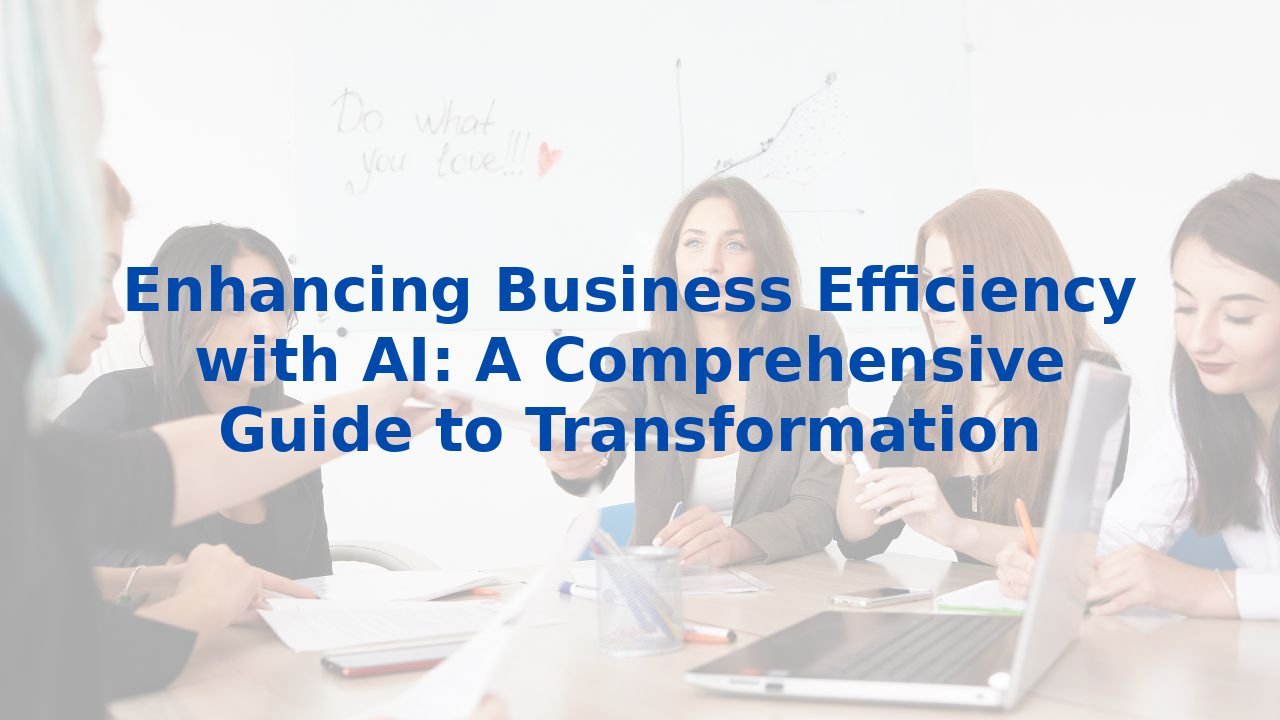Enhancing Business Efficiency with AI: A Comprehensive Guide to Transformation
Enhancing Business Efficiency with AI: A Comprehensive Guide to Transformation
In today's fast-paced business environment, the quest for operational efficiency is relentless. Organizations are increasingly turning to Artificial Intelligence (AI) as a transformative force to streamline processes, reduce costs, and enhance productivity. In this guide, we will explore how AI can revolutionize various business processes and the distinct advantages it offers in improving efficiency.
1. Automating Routine Tasks
One of the most compelling benefits of AI is its capability to automate mundane and repetitive tasks. These essential yet time-consuming activities—like data entry, invoice processing, and sorting emails—can bog down human resources. By deploying AI-powered bots and software, businesses can minimize human error and speed up workflows. Automation creates space for employees to focus on strategic tasks that drive innovation and growth. Think of AI as your ally in liberating your team’s talent for higher pursuits.
2. Data Analysis and Insights
In an era defined by information overload, data analysis is crucial for operational efficiency. AI augments this process, making it more streamlined and effective. Its ability to sift through massive datasets unveils patterns and trends that escape human notice. A game-changer in predictive analytics, AI not only forecasts customer behavior but also shines a light on market dynamics. This capability diminishes inefficiencies, conserves resources, and ensures optimal allocation where it's needed the most.
3. Personalized Customer Experience
Imagine being able to offer customers tailored experiences at every touchpoint. AI’s proficiency in analyzing vast datasets empowers businesses to understand customer preferences, purchase history, and browsing patterns. With this knowledge, organizations can deliver hyper-targeted product recommendations and customized marketing messages. The result? Enhanced customer satisfaction and deeper brand loyalty that enriches the value of your customer relationships.
4. Process Optimization
At the heart of AI's impact lies its remarkable ability to optimize processes. By scrutinizing workflows, AI identifies bottlenecks and redundancies that hinder progress. Armed with these insights, businesses can reorganize workflows, automate manual tasks, and reallocate resources with an eye toward maximizing productivity. This optimization not only speeds up task completion but also fosters a leaner operational framework, ultimately driving significant cost savings.
5. Continuous Monitoring and Optimization
Operational efficiency thrives on relentless oversight. AI systems are designed for perpetual monitoring, providing real-time insights that prompt immediate course corrections. For example, AI-driven sensors in manufacturing detect anomalies swiftly, enabling proactive maintenance that curtails downtime. This continuous monitoring ensures that processes remain optimized and aligned with your organization’s ever-evolving goals.
6. Risk Management and Supply Chain Optimization
AI's analytical prowess equips businesses with profound visibility into possible risks and opportunities. By exploring complex relationships within extensive datasets, AI can forecast emerging trends and assess market volatility. This proactive approach allows companies to navigate uncertainties while seizing opportunities. Additionally, within supply chain management, AI analyzes historical and real-time data to predict fluctuations in demand, optimize inventory, and suggest more efficient shipping routes, thus enhancing overall responsiveness.
7. Quality Control and Assurance
In today's competitive landscape, maintaining high-quality standards is paramount. AI-driven quality control ensures that products meet rigorous criteria through real-time oversight of manufacturing processes. By identifying defects early, AI prevents subpar products from tarnishing your brand's reputation. The outcomes speak volumes: superior product quality, reduced waste, and heightened consumer trust.
The Benefits of Training Employees for AI
While AI is undeniably powerful, its success hinges on human interaction. Training your team to work effectively with these technologies yields undeniable advantages:
- Enhanced Productivity: Automation frees employees from routine tasks, empowering them to engage in more complex, creative work. Proper training on AI tools amplifies this productivity, enabling your workforce to harness AI's full potential.
- Improved Decision-Making: AI-generated insights are only as good as the understanding of those who interpret them. Tailored training equips employees with the skills to make informed, data-driven decisions, fostering a culture of strategic thinking.
- Adaptability and Agility: The landscape of AI is continually evolving. Regular training helps employees stay ahead of technological advancements, ensuring that they remain adaptable and relevant in a swiftly changing business environment.
Conclusion
In summary, AI is not just a buzzword—it's a transformational force that can drastically enhance business efficiency. From automating routine tasks and delivering deep insights to personalizing customer interactions and optimizing processes, AI presents a vast array of opportunities to drive operational excellence. But remember, the human element cannot be overlooked. By investing in employee training and development, organizations can ensure their workforce is equipped to leverage AI effectively, fostering a culture of growth and innovation. Embracing these technologies is not just an option; it's a strategic necessity for any organization aiming to thrive in our increasingly complex business landscape.



